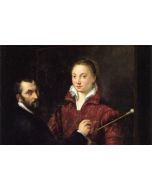Change must come: art, politics and society

- Course Code: VB212
- Dates: 23/04/24 - 18/06/24
- Time: 18:00 - 20:00
- Taught: Tue, Evening
- Duration: 8 sessions (over 9 weeks)
- Location: Keeley Street
- Tutor: Sarah Jaffray
Course Code: VB212
Duration: 8 sessions (over 9 weeks)
Please note: We offer a wide variety of financial support to make courses affordable. Just visit our online Help Centre for more information on a range of topics including fees, online learning and FAQs.
What is the course about?
Art is a social product that has political implications. Whether deliberately political or indirectly politicised, art has frequently been used to express and question political and social ideas. Many artists have used their work to participate in, or critique, the societies in which they live, and plenty of art works have been used to manipulate viewers in the form of propaganda.
This art history course will explore art’s often uneasy relationship with politics, and asks whether art has a role to play within this area. We ask (and hopefully answer) the question: how does art impact social values, impact cultural perception and make change?
What will we cover?
- An overview of particular types of 'Political Art' and the periods in which they were created.
- The work of particular Political Artists including Jacques-Louis David, Frida Kahlo, David Wojnarowicz, Dorothea Lange, Gustave Courbet and theorists like Walter Benjamin, Linda Nochlin and Edward Said.
- The future of Political Art and its relation to other disciplines, e.g. Film and Photography.
- Key theoretical approaches in the History of Art that emphasise political views
- The socio-economic and cultural context relevant to particular periods of Political Art.
- The relationship between the content of Political Art and its form.
What will I achieve?
By the end of this course you should be able to...
- Identify some key points in the history of Political Art in the modern, Western world
- Engage with works of Political Art from both a theoretical and practical perspective.
- Demonstrate an awareness of how certain traditions in the History of Art inform how certain works of Political Art are produced and read.
- State the influence of the historical context on examples of political art.
- Engage with questions about the future of Political Art.
What level is the course and do I need any particular skills?
Some familiarity with art and its history is recommended but beginners arewelcome. This course includes readings to further flesh out our subject matter. These readings will be challenging, but are used to help students come to grips with challenging ideas. If you are concerned about reading level and would like to know more, please feel free to email humanities@citylit.ac.uk for more information.
You should be able to follow simple written and verbal instructions, demonstrations, hand-outs and health and safety information, and will be invited to take part in group discussion.
How will I be taught, and will there be any work outside the class?
You will be taught with lecture, slide presentations and group discussions. This course has homework in the form of assigned readings (please see information above). Readings are estimated to take about 30 mins to one hour per week, outside of classtime.
This course uses a Google Classroom to share documents and readings. You will be invited to join the Google Classroom within a week of the start of this course.
Are there any other costs? Is there anything I need to bring?
You might wish to buy some of the books on the reading list given out in class.
When I've finished, what course can I do next?
Feminism in modern and contemporary art
Art and Critical Theory: feminism and post-colonialism
Introduction to Tate Modern
Representing the foreign in early modern Europe.
Sarah Jaffray holds a BA and MA in Art History with an emphasis in 19th/20th century France and a minor in the Italian Renaissance. She holds a second MA in Cultural Theory from Goldsmiths, University of London. Sarah was a lecturer for several colleges and universities in the Los Angeles area before relocating to London in 2012. She has worked in curatorial roles at the British Museum and Wellcome Collection. In addition to her current teaching at City Lit, Sarah is a lecturer at the University of Arts London and the Tutor Coordinator for City Lit's Art History programme. Her art historical practice focuses on experimental narratives, artistic process, art pedagogy, politics and philosophy. Sarah's current research is focused on translation and empathy.
Please note: We reserve the right to change our tutors from those advertised. This happens rarely, but if it does, we are unable to refund fees due to this. Our tutors may have different teaching styles; however we guarantee a consistent quality of teaching in all our courses.
